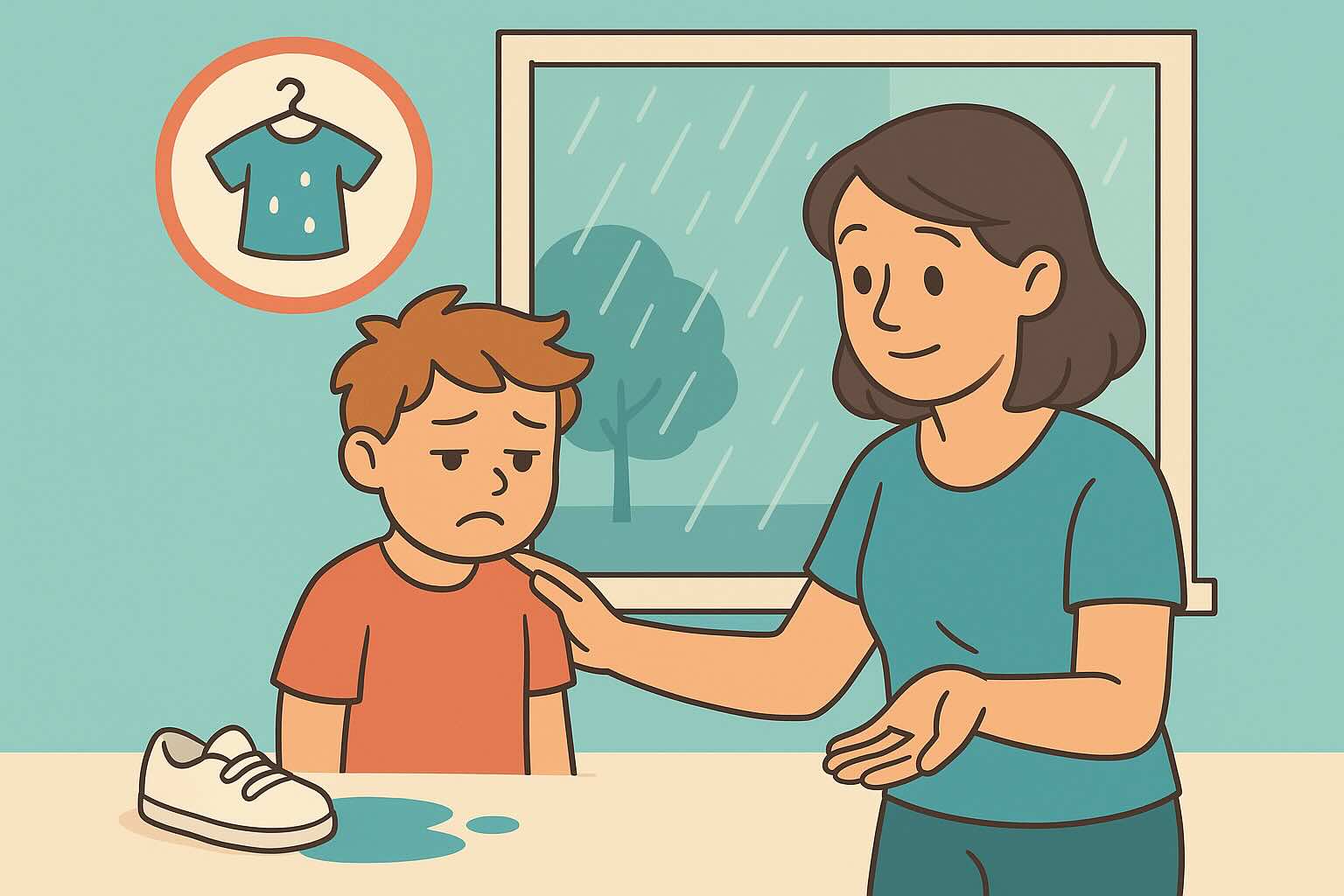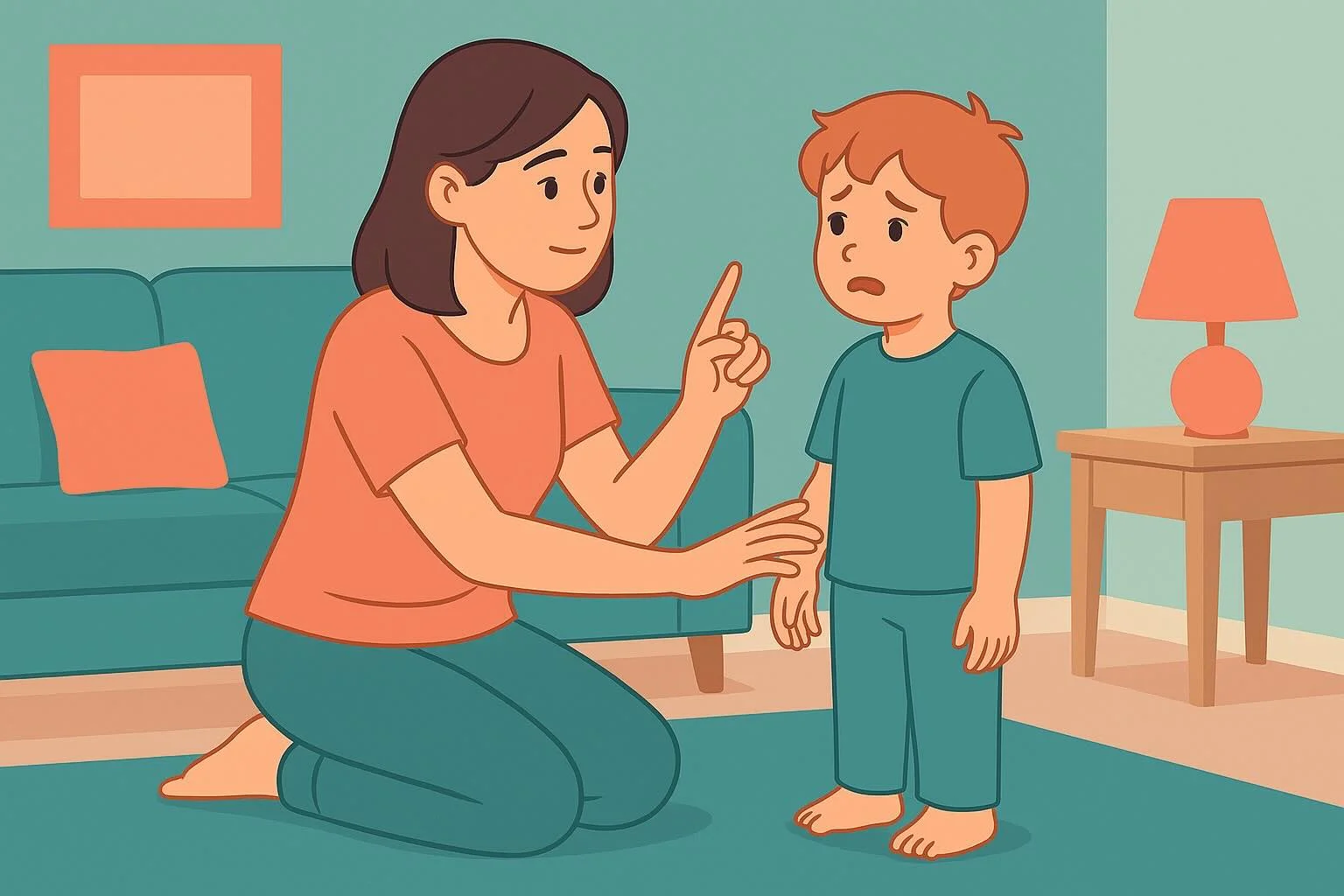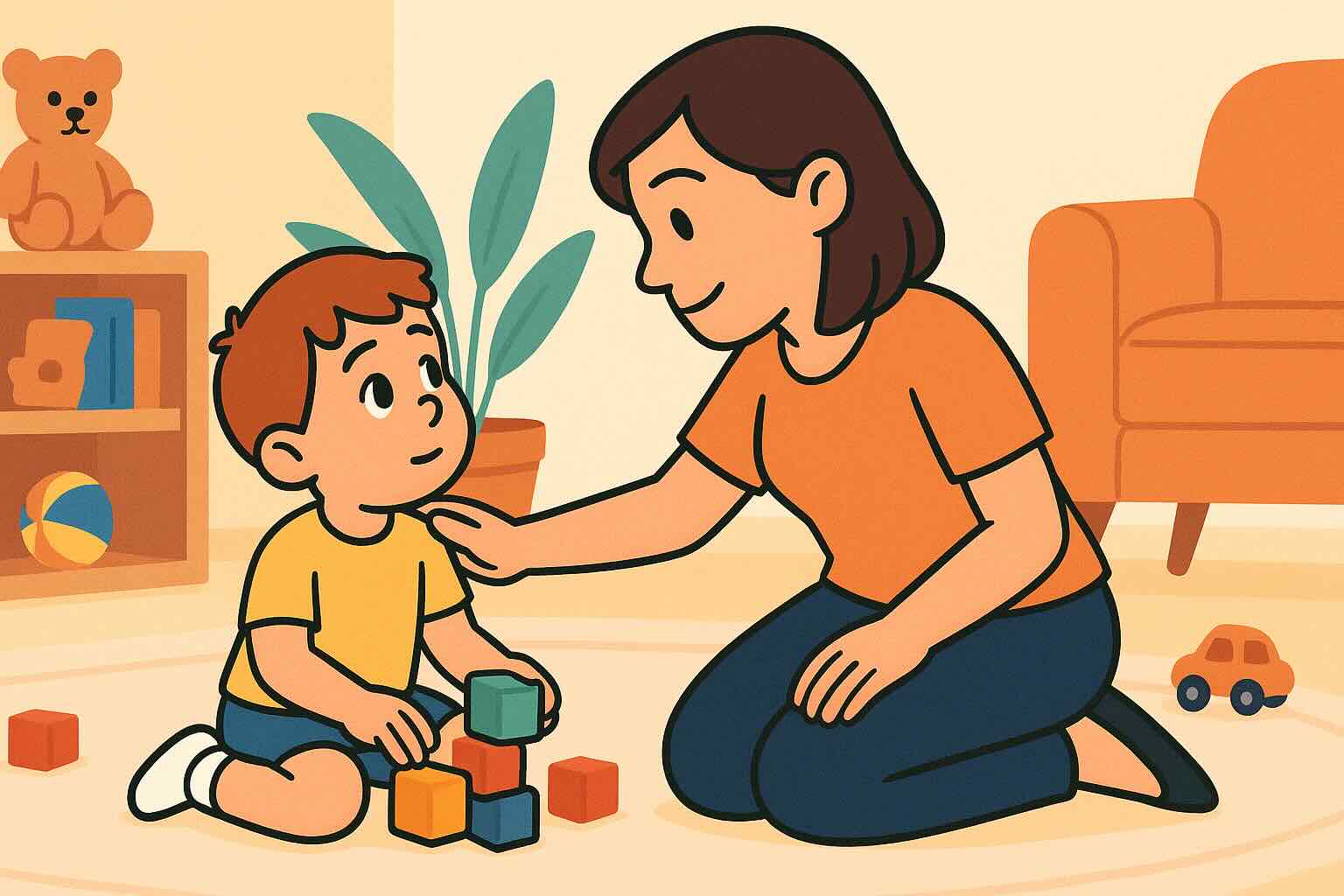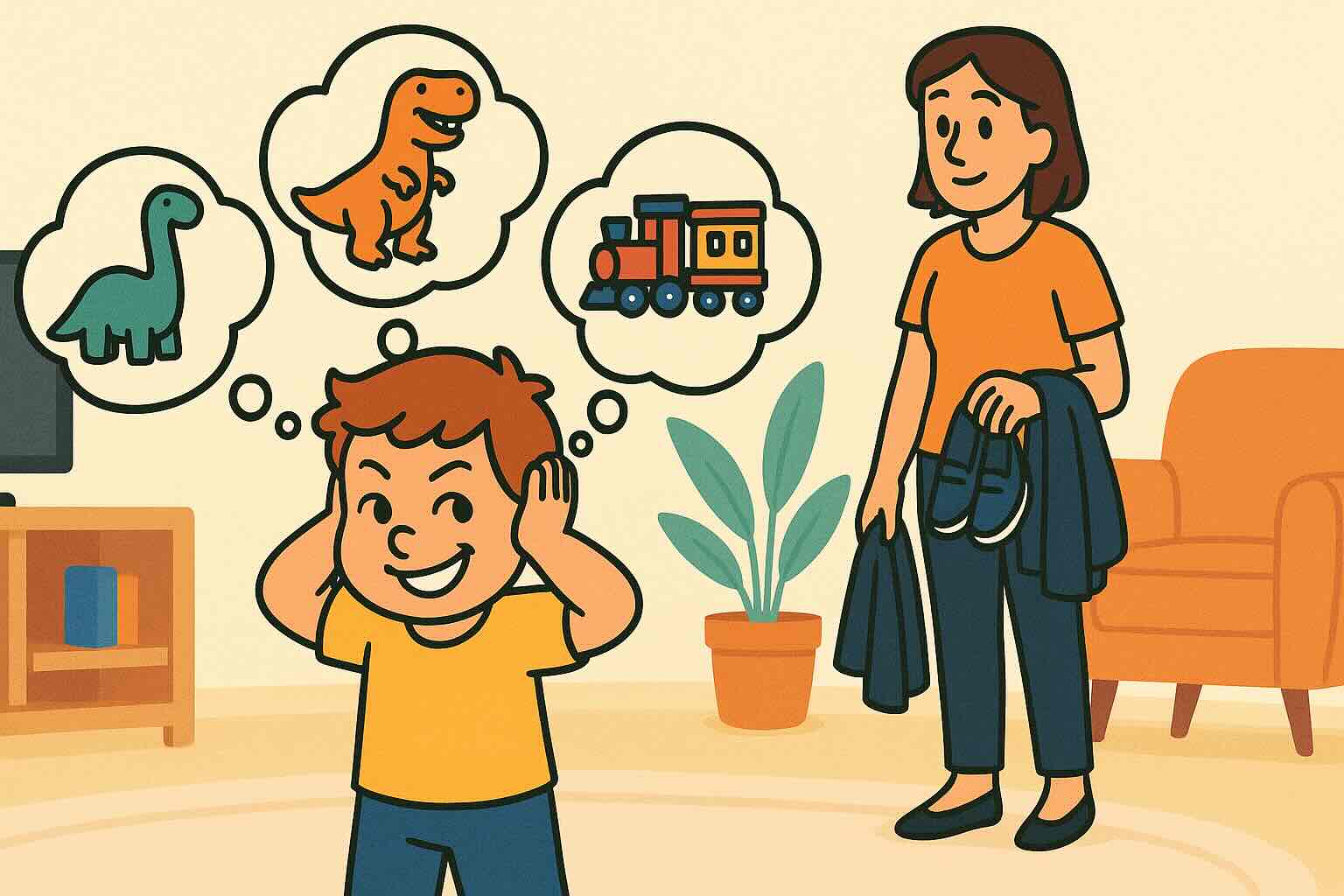Positive Discipline for 6 Year Olds: Moral Reasoning


Your 6-year-old comes home from first grade and announces they hate their teacher because she gave them a "yellow card" for talking during quiet work time. Later, they refuse to do homework, declaring it's "stupid and unfair," and when you try to help, they crumple up their worksheet and throw a dramatic fit. Your instinct might be to lecture about respect and responsibility or implement strict consequences. But what if this moment is actually an opportunity to build moral reasoning and genuine problem-solving skills?
Positive discipline for 6-year-olds recognizes their remarkable cognitive growth while still honoring their need for emotional support and character development. Six-year-olds are at a fascinating developmental stage where they can engage in complex moral reasoning, understand abstract concepts like fairness and integrity, and participate as genuine partners in family problem-solving. Yet they still have the emotional volatility and impulse control challenges of young children.
This comprehensive guide provides specific examples, detailed scripts, and sophisticated strategies for common 6-year-old challenges. You'll learn how to build on their expanding cognitive abilities while nurturing the emotional intelligence and self-discipline that will serve them throughout their academic and social lives. For complementary approaches, see our guides on building internal motivation and curious not furious parenting.
What You'll Learn in This Guide
- The 6-Year-Old's Cognitive Revolution - Understanding their advanced reasoning and moral development
- Building Genuine Self-Discipline - Moving from external control to internal motivation
- Academic and Social Challenges - Navigating first grade pressures and peer relationships
- Advanced Problem-Solving Partnership - Engaging them as capable family contributors
- Moral Reasoning Development - Supporting their emerging sense of right and wrong
- Complex Emotional Support - Handling perfectionism, anxiety, and social pressures
- Real-World Scenario Solutions - Specific examples with sophisticated responses
- Character-Based Discipline - Connecting daily choices to long-term identity formation
Estimated reading time: 18 minutes
Understanding Your 6-Year-Old's Cognitive Revolution
The Remarkable 6-Year-Old Mind
Advanced Cognitive Abilities:
- Abstract thinking - Can understand concepts like honesty, fairness, loyalty, and integrity
- Moral reasoning - Beginning to understand why rules exist and what makes actions right or wrong
- Complex problem-solving - Can think through multi-step solutions and consider various perspectives
- Future-oriented thinking - Understanding how today's choices affect tomorrow's outcomes
- Sophisticated memory - Can recall detailed events, conversations, and lessons from weeks ago
Social and Emotional Complexity:
- Peer relationships - Deep concern about friendship, acceptance, and social status
- Identity formation - Strong sense of personal preferences, values, and self-concept
- Justice orientation - Intense focus on fairness, rules, and "right" ways of doing things
- Empathy development - Genuine concern for others' feelings and wellbeing
- Performance awareness - Understanding of success, failure, and comparison to others
Still Developing:
- Emotional regulation - Advanced thinking doesn't guarantee emotional control
- Impulse management - Knowledge of right choice doesn't always prevent wrong choice
- Stress tolerance - Academic and social pressures can overwhelm their systems
- Consistent application - May apply moral reasoning inconsistently across situations
The School-Age Brain and Behavior
Why 6-year-olds can seem contradictory:
- They can discuss complex moral scenarios but still hit when frustrated
- They understand family rules but may test boundaries extensively
- They show genuine empathy but can also be surprisingly selfish
- They desire independence but still need significant emotional support
The developmental reality:
- Their prefrontal cortex (executive function) is still immature despite cognitive advances
- School pressures can exhaust their self-regulation reserves
- Social complexities create new stressors they're learning to navigate
- They're developing their identity partly through testing and challenging
Core Principles for 6-Year-Old Positive Discipline
Principle 1: Engage Their Moral Reasoning
Connect daily choices to character development and personal values.
Traditional approach: "Because I said so" or arbitrary rules Positive discipline: "What kind of person do you want to be in this situation?"
Principle 2: Build Problem-Solving Partnership
Include them as capable contributors to family decisions and solutions.
Traditional approach: Parent decides consequence and child complies Positive discipline: "What ideas do you have for solving this problem fairly?"
Principle 3: Honor Their Social World
Take their peer relationships and school experiences seriously while providing guidance.
Traditional approach: "Don't worry about what other kids think" Positive discipline: "Friendships are important to you. Let's figure out how to handle this situation."
Principle 4: Develop Internal Accountability
Help them take ownership of their choices and their impact on others.
Traditional approach: External consequences imposed by adults Positive discipline: "When you made that choice, what happened? How do you want to handle it?"
Real-Life Positive Discipline Examples by Situation
Scenario 1: Academic Pressure and School Behavior Issues
The Situation: Your 6-year-old received a behavior consequence at school for being disruptive during math, and now they're refusing to do homework, saying "I'm stupid at math and I hate school."
Traditional Response: "You're not stupid! Stop being so dramatic and just do your homework. If you don't finish it, you're losing screen time tonight."
Positive Discipline Response:
Step 1 - Validate Their Emotional Experience "Math felt really hard today, and then you got in trouble, and now you're feeling defeated and frustrated. That's a lot to handle."
Step 2 - Gather Information Without Judgment "Help me understand what happened during math class. What made it hard to focus?"
Step 3 - Separate Behavior from Identity "You're not stupid at math - you're learning math, and learning can be challenging. What specific part of math feels hardest right now?"
Step 4 - Problem-Solve Together "So when math gets frustrating, you start talking to friends instead of focusing. What are some other ways you could handle that frustrated feeling at school?"
Step 5 - Address the Homework Resistance "Right now homework feels overwhelming because you're already feeling bad about math. What would help you feel more successful with it?"
Step 6 - Connect to Growth and Character "When things are hard, we have choices about how to respond. What kind of student do you want to be when facing challenges?"
Follow-up Support: "Let's practice some strategies for when math gets frustrating, and I'll talk to your teacher about what might help you succeed in class."
Why This Works:
- Validates the legitimate stress of academic challenges
- Separates temporary struggles from identity
- Builds problem-solving skills for school situations
- Addresses root causes rather than just homework compliance
- Connects to character development and growth mindset
Scenario 2: Complex Social Drama and Friendship Conflicts
The Situation: Your 6-year-old comes home upset because their friend group excluded them from a game at recess, and now they're saying they want to exclude those friends from their birthday party "to show them how it feels."
Traditional Response: "Two wrongs don't make a right! You can't exclude them from your party just because they hurt your feelings. That's not how we treat friends."
Positive Discipline Response:
Step 1 - Honor Their Social World "Being excluded by friends really hurts. That's one of the most painful experiences people can have, especially when it's people you care about."
Step 2 - Validate Their Emotional Logic "You want them to understand how it feels to be left out. That makes sense - when we're hurt, we sometimes want others to understand our experience."
Step 3 - Explore Their Perspective "Tell me more about what happened at recess. Do you think they meant to hurt your feelings, or could something else have been going on?"
Step 4 - Develop Empathy and Problem-Solving "How do you think they would feel if they weren't invited to your party? Would that help them understand your feelings, or might it create more problems?"
Step 5 - Connect to Character Values "What kind of friend do you want to be? When someone hurts you, how do you want to respond in a way that shows your character?"
Step 6 - Generate Alternative Solutions "What are some ways you could help them understand how exclusion feels without excluding them back? How could you address this with them directly?"
Follow-up Support: "Let's practice what you might say to them tomorrow. And let's think about other friends you enjoy playing with too."
Why This Works:
- Takes their social world seriously without dismissing their feelings
- Builds empathy and perspective-taking skills
- Helps them understand the difference between justice and revenge
- Develops sophisticated social problem-solving abilities
- Connects daily choices to character development
Scenario 3: Lying and Dishonesty About Responsibilities
The Situation: You discover your 6-year-old has been lying about brushing their teeth for over a week, and when confronted, they continue to insist they did brush them despite clear evidence to the contrary.
Traditional Response: "I know you're lying! I can see your toothbrush is dry and your teeth aren't clean. You're in big trouble for lying to me!"
Positive Discipline Response:
Step 1 - Create Safety for Truth "I can see that your toothbrush is dry and your teeth don't look brushed. Help me understand what's been happening with tooth brushing."
Step 2 - Address the Lying Without Shame "It seems like you've been telling me you brushed your teeth when you actually didn't. I'm wondering what made it hard to tell me the truth about this."
Step 3 - Explore the Underlying Issues "What's been making tooth brushing difficult? Are you forgetting, running out of time, or is there something else going on?"
Step 4 - Problem-Solve the Original Issue "Let's figure out how to make tooth brushing work better for you. What ideas do you have for remembering and following through?"
Step 5 - Address Trust and Honesty "When we're not honest with each other, it makes it hard to trust and solve problems together. How can we rebuild trust about this?"
Step 6 - Connect to Character and Relationships "Being honest, even when we've made mistakes, is part of having strong relationships. What kind of person do you want to be when you've made an error?"
Natural Consequence: "Since tooth brushing hasn't been happening consistently, I'll need to check and help until you show me you can handle this responsibility independently."
Why This Works:
- Creates safety for honesty rather than trapping them in lies
- Addresses the root problem, not just the lying symptom
- Builds problem-solving skills around daily responsibilities
- Teaches about trust and relationship repair
- Connects to character development and personal integrity
Scenario 4: Sibling Conflicts with Emotional Manipulation
The Situation: Your 6-year-old is fighting with their 4-year-old sibling and starts using sophisticated emotional manipulation: "Mom loves you more than me" and "I wish I was never born" when you intervene in their conflict.
Traditional Response: "Stop being so dramatic! Of course I love you! Now apologize to your brother and go to your room for saying such ridiculous things!"
Positive Discipline Response:
Step 1 - Address the Emotional Pain Behind the Drama "Those are some really big, painful feelings you're expressing. It sounds like you're feeling unloved and like you don't belong in our family."
Step 2 - Validate Without Reinforcing the Behavior "Sometimes when we're upset about one thing, all our worries come out at once. You're mad about the toy situation with your brother, and now you're worried about my love too."
Step 3 - Separate the Issues "Let's talk about these separately. First, my love for you - that never changes, no matter what happens with toys or fighting. You're my child forever and always."
Step 4 - Address the Original Conflict "Now, about the problem with your brother and the toy. What happened there, and how can we solve it fairly?"
Step 5 - Teach Better Emotional Expression "When you're feeling jealous or worried about my love, what's a better way to tell me than saying you wish you weren't born?"
Step 6 - Connect to Family Values "In our family, we work through problems together. Even when we're upset, we treat each other with respect. How can you and your brother solve toy problems in ways that keep our family feeling good?"
Why This Works:
- Addresses the emotional pain without reinforcing manipulation
- Separates relationship security from conflict resolution
- Teaches appropriate emotional expression
- Builds conflict resolution skills
- Maintains family connection while addressing behavior
Scenario 5: Perfectionism and Fear of Failure
The Situation: Your 6-year-old is working on a school project and becomes increasingly frustrated, finally tearing up their work and sobbing "I can't do anything right! I'm terrible at everything!"
Traditional Response: "Don't be so hard on yourself! Your work is fine! Stop crying and just try again - it doesn't have to be perfect!"
Positive Discipline Response:
Step 1 - Validate Their High Standards "You have such high standards for yourself, and when your work doesn't match what you pictured in your mind, it's really frustrating."
Step 2 - Normalize the Learning Process "Learning new things means making lots of mistakes and trying many times. That's how everyone gets good at things - even adults."
Step 3 - Address the All-or-Nothing Thinking "Your brain is telling you that if this project isn't perfect, you're terrible at everything. But that's not how learning works. You can be learning and growing even when things don't turn out exactly as you hoped."
Step 4 - Focus on Process Over Product "What parts of this project did you enjoy working on? What new things are you learning through this process?"
Step 5 - Teach Self-Compassion "How would you talk to your best friend if they were struggling with a project like this? Can you use that same kind voice with yourself?"
Step 6 - Problem-Solve the Project "What would help you feel more successful with this project? Should we break it into smaller steps, take a break, or approach it differently?"
Why This Works:
- Validates their desire for excellence without reinforcing perfectionism
- Teaches growth mindset and resilience
- Builds self-compassion and emotional regulation
- Focuses on learning process rather than just outcomes
- Provides practical support for the immediate challenge
Advanced Problem-Solving and Moral Reasoning
Developing Their Moral Compass
6-year-olds can understand sophisticated moral concepts:
- Integrity: Doing the right thing even when no one is watching
- Fairness: Considering everyone's needs, not just equal treatment
- Responsibility: Understanding that choices have consequences for self and others
- Empathy: Genuinely caring about others' wellbeing
- Honesty: Telling the truth even when it's difficult
The "Character Question" Approach
Instead of focusing on rules, ask character questions:
- "What kind of person do you want to be in this situation?"
- "How would someone with strong character handle this problem?"
- "What choice would make you proud of yourself?"
- "If everyone made this choice, what kind of world would we have?"
Example in Practice: Child wants to quit piano after two weeks Instead of: "You made a commitment and you have to stick with it!" Try: "You're finding piano harder than you expected. What kind of person do you want to be when facing challenges? What would help you decide what's right for you?"
Family Ethics Discussions
Regular conversations about moral scenarios:
- "What would you do if you found money on the playground?"
- "How should we handle it when someone is being excluded?"
- "What does it mean to be a good friend when someone makes a mistake?"
- "How do we balance being honest with being kind?"
Building Advanced Empathy
Move beyond "How would you feel?" to deeper perspective-taking:
- "What do you think was going through their mind when that happened?"
- "Why might someone act that way even though it seems mean?"
- "What might they need that they're not getting?"
- "How might their experience be different from yours?"
Natural Consequences and Logical Learning
Complex Consequences 6-Year-Olds Can Handle
6-year-olds can learn from consequences that:
- Are delayed by days or even weeks
- Involve complex social and relationship impacts
- Connect to abstract concepts like trust, reputation, and character
- Have multiple layers and long-term implications
Sophisticated Natural Consequence Examples
Academic Responsibility:
- Situation: Consistently rushes through homework without care
- Natural consequence: Lower grades, teacher conferences, need for additional support
- Your support: "When homework is rushed, it doesn't show your learning, and teachers can't see what you actually know. What do you notice about your grades lately?"
Social Relationships:
- Situation: Gossips or shares friends' secrets
- Natural consequence: Friends stop trusting them with personal information
- Your support: "When we share people's secrets, they stop telling us personal things. What are you noticing about your friendships lately?"
Personal Integrity:
- Situation: Doesn't follow through on commitments to friends or activities
- Natural consequence: Others stop counting on them, fewer invitations and opportunities
- Your support: "When people can't count on us to follow through, they stop including us in plans. What have you noticed about invitations lately?"
Family Contribution:
- Situation: Doesn't complete agreed-upon family responsibilities
- Natural consequence: Family functioning is disrupted, privileges associated with family membership are affected
- Your support: "When family members don't do their part, it affects everyone. What do you notice about how our family works when responsibilities aren't handled?"
Creating Meaningful Logical Consequences
Trust and Honesty:
- Situation: Lying about completion of responsibilities or activities
- Logical consequence: Increased supervision and check-ins until trust is rebuilt
- Script: "When there's dishonesty, I need to verify things myself until I can count on your word again. How can we work together to rebuild trust?"
Respect and Kindness:
- Situation: Hurtful words or actions toward family members
- Logical consequence: Work to repair relationships and make amends
- Script: "When we hurt people we care about, we need to work to repair the relationship. What would help [person] feel better? How can you show that you understand the impact of your words?"
Privilege and Responsibility:
- Situation: Misusing privileges or not handling freedoms appropriately
- Logical consequence: Return to more supervised level until demonstrating readiness
- Script: "This privilege requires showing responsibility. When you're ready to handle it appropriately, we can try again."
Building Self-Discipline and Internal Motivation
Moving Beyond External Control Systems
Why external motivations become counterproductive at this age:
- 6-year-olds can become dependent on external validation
- Reward systems can undermine intrinsic motivation for learning and helping
- They begin to negotiate and manipulate reward systems
- Character development requires internal values, not external incentives
Fostering Genuine Internal Motivation
Focus on internal satisfaction and character development:
- "How did it feel when you helped your friend solve that problem?"
- "What did you learn about yourself when you kept trying even though it was hard?"
- "When you told the truth even though you were scared, that took real courage"
- "You're becoming someone others can really count on"
Connect daily choices to long-term identity:
- "That choice shows you're developing into someone with integrity"
- "You're building a reputation as someone who cares about others"
- "When you work hard even when you don't feel like it, you're developing self-discipline"
- "That decision shows you're thinking about the kind of person you want to be"
Teaching Self-Reflection and Self-Evaluation
Help them develop internal assessment skills:
- "How do you feel about the choice you made there?"
- "What are you most proud of about how you handled that situation?"
- "If you could do it over, what might you do differently?"
- "What did you learn about yourself through this experience?"
Build their ability to self-correct:
- "What do you think you should do to make this right?"
- "How can you show that you've learned from this mistake?"
- "What kind of repair would be meaningful here?"
- "What would help you make a better choice next time?"
Supporting School Success and Social Development
Understanding 6-Year-Old School Challenges
Common issues 6-year-olds face:
- Increased academic expectations and performance pressure
- Complex social dynamics and friendship drama
- Comparison to peers and perfectionist tendencies
- Balancing independence with need for support
- Managing multiple teachers, rules, and environments
Partnership with School
Collaborative approach with teachers:
- Share what motivates and works for your child at home
- Ask about social dynamics and peer relationships
- Discuss approaches that support learning rather than just compliance
- Address challenges proactively before they become problems
- Focus on character development alongside academic progress
Home Support for School Success
Building skills that transfer to school:
- Practice problem-solving social scenarios through role-play
- Teach emotional regulation strategies they can use independently
- Build organizational and time management skills
- Encourage growth mindset about learning and mistakes
- Develop their ability to advocate for their own needs appropriately
When 6-Year-Olds Need Additional Support
Recognizing When Normal Development Needs Professional Guidance
Consider consulting a professional if:
- Behaviors are dangerous, extremely disruptive, or concerning to school
- Your child expresses persistent hopelessness, anxiety, or depression
- Social relationships are consistently problematic across settings
- Academic struggles seem disproportionate to ability or effort
- Family functioning is severely impacted despite consistent positive approaches
Common Areas Where 6-Year-Olds May Need Extra Support
Academic challenges:
- Learning differences or processing issues
- Attention and focus difficulties
- Perfectionism or anxiety about performance
Social difficulties:
- Trouble reading social cues or understanding peer dynamics
- Difficulty with conflict resolution or friendship skills
- Intense sensitivity to peer rejection or criticism
Emotional regulation:
- Anxiety, worry, or fear that interferes with daily functioning
- Difficulty managing disappointment, frustration, or anger
- Perfectionist tendencies that create distress
4-Week Implementation Plan for 6-Year-Olds
Week 1: Foundation and Moral Reasoning
- Begin asking "character questions" instead of imposing rules
- Practice validating their perspective before correcting behavior
- Start weekly family meetings with ethics discussions
- Focus on connecting daily choices to character development
Week 2: Advanced Problem-Solving and Consequences
- Implement collaborative problem-solving for family challenges
- Let complex, age-appropriate natural consequences happen
- Practice perspective-taking and empathy development
- Build their self-reflection and self-evaluation skills
Week 3: Internal Motivation and School Partnership
- Focus on internal satisfaction over external rewards
- Partner with school on consistent character-building approaches
- Increase their decision-making responsibilities
- Practice advanced social problem-solving scenarios
Week 4: Integration and Long-Term Character Development
- Evaluate which approaches resonate most with your child
- Plan for continued moral reasoning development
- Establish regular character and ethics discussions
- Celebrate their growth in responsibility and empathy
Success Indicators for 6-Year-Old Positive Discipline
Short-Term Changes (2-4 weeks)
- Engages in moral reasoning discussions
- Shows increased empathy and concern for others' wellbeing
- Takes ownership of mistakes and works on repair
- Demonstrates problem-solving thinking in conflicts
Medium-Term Growth (2-3 months)
- Handles school social situations with increasing independence
- Shows genuine cooperation based on understanding rather than compliance
- Demonstrates internal motivation for positive choices
- Builds and maintains friendships through good character
Long-Term Development (6+ months)
- Strong moral compass that guides decision-making
- Emotional regulation skills appropriate for their age
- Genuine empathy and consideration in relationships
- Internal motivation and self-discipline
- Character-based identity and pride in doing the right thing
Key Takeaways: Positive Discipline for 6-Year-Olds
- ✅ Engage their advanced moral reasoning while supporting continued emotional development
- ✅ Focus on character development over rule compliance
- ✅ Build genuine problem-solving partnership while maintaining appropriate guidance
- ✅ Use complex natural consequences that connect to abstract concepts
- ✅ Support their social world while teaching relationship skills
- ✅ Develop internal motivation through character connection
- ✅ Address perfectionism with growth mindset and self-compassion
- ✅ Partner with school on character-based approaches
- ✅ Build self-reflection skills for lifelong growth
- ✅ Connect daily choices to long-term identity and character formation
Remember: Your 6-year-old is developing remarkable moral reasoning abilities while still needing emotional support and character guidance. When you respond to their challenges with respect for their growing moral compass and patience for their developing self-control, you're building the foundation for a lifetime of integrity, empathy, and internal motivation. The character development you invest in now will serve them well throughout their school years and into adulthood.
This article is based on moral development research, educational psychology, and positive discipline principles. Every child develops uniquely, and character building takes time and consistency. Focus on progress and relationship-building rather than perfection as you develop these life-shaping parenting skills.
Challenging Moments Support
Access step-by-step parenting strategies, quick tips, and age-specific guidance for difficult situations when you need it most.

24/7 AI Parenting Assistant
Get instant, personalized advice with expert-curated parenting knowledge. Chat with your AI coach anytime, anywhere.

Boundary Setting Scripts
Set firm, loving boundaries without punishment using evidence-based scripts and strategies that build cooperation and respect.
Frequently Asked Questions
Need personalized support?
RootWise's AI coach can provide tailored strategies for your specific situation, available 24/7 when you need it most.
Learn More About AI Coaching →



